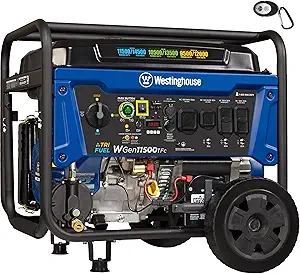
Introduction
Power outages caused by natural disasters, fuel shortages, or aging electrical infrastructure are becoming more frequent. In such moments, having a dependable and adaptable source of power can make all the difference. This is where tri-fuel portable generators come into play. These powerhouses are designed to run on gasoline, propane, or natural gas, giving users unmatched flexibility in a wide range of emergency and residential situations.
What makes tri-fuel generators stand out is their ability to adapt to available fuel sources. If gasoline is scarce during a crisis, propane or natural gas can keep your essential appliances running. These units offer a long runtime, reduced emissions when using propane or natural gas, and safe indoor-outdoor operation options with the right setup. Most models today include features like electric or remote start, CO (carbon monoxide) safety alerts, and transfer switch compatibility, allowing easy integration with your home’s electrical system.
Best Tri-Fuel Portable Generators for Reliable Home Backup Power
| Product Name | Links |
|---|---|
| Westinghouse 14500 Peak Watt Tri-Fuel | Amazon Link |
| DuroMax XP13000HXT Tri Fuel 13,000 W | Amazon Link |
| WEN 14500-Watt Tri-Fuel Generator | Amazon Link |
| Westinghouse 13500 Peak Watt Tri-Fuel | Amazon Link |
| Westinghouse 18000 Peak Watt Tri-Fuel | Amazon Link |
Understanding Tri-Fuel Generators
Why Fuel Flexibility Matters
The defining advantage of tri-fuel generators is their fuel versatility. In emergency conditions, access to gasoline may be limited or delayed. Propane can be stored long-term without degradation, while natural gas—available from municipal lines—offers virtually unlimited runtime. The ability to choose the fuel based on availability ensures that you’re never left powerless when it matters most.
Efficiency and Runtime
Many of the models listed above, such as the Westinghouse 14500 and 18000 series, deliver extended runtimes—up to 19 hours on gasoline depending on the load. When running on propane or natural gas, runtime can be even longer, especially for lighter loads or continuous use applications like sump pumps, refrigerators, and HVAC systems.
Clean Power and Emission Benefits
Propane and natural gas burn cleaner than gasoline, meaning these generators produce fewer greenhouse gases and carbon monoxide. This translates to better air quality and less wear and tear on the engine, reducing maintenance frequency and costs.
Safety Features: CO Alert Technology
With any fuel-burning generator, carbon monoxide (CO) exposure is a serious concern. Most modern tri-fuel models now include CO sensors or automatic shutdown mechanisms to prevent dangerous gas buildup. These features help protect your household, particularly if the generator is running in an attached garage, basement, or near doors and windows. Some users should be aware that CO sensors can be overly sensitive and may trigger under poor ventilation conditions, even when there is no safety risk. Proper outdoor placement is critical for any generator.
Power Output and Capacity
The models in this guide cover a broad range of wattages, from 10,500 running watts to 14,500 running watts, capable of powering large appliances, electric tools, and even full home electrical systems via a transfer switch. The Westinghouse 18000 offers an impressive 14,500W continuous output, suitable for larger homes or commercial backup needs. Meanwhile, more modest setups like the WEN 14500-Watt deliver stable, clean power for medium-sized households.
Generator Features That Matter
- Remote and Electric Start: Starting the generator with the push of a button—often remotely—saves time and effort, especially in harsh weather.
- Transfer Switch Compatibility: Many models are designed to easily connect to your home’s electrical panel, allowing you to power entire circuits safely.
- Durability: Robust engines, metal frames, and heavy-duty wheels are all standard in this class. For example, the DuroMax XP13000HXT has a 500cc engine for heavy loads.
- Outlet Variety: Multiple 120V and 240V outlets, including GFCI and twist-lock types, allow you to run everything from kitchen appliances to power tools simultaneously.
Model Comparisons and Use Cases
Westinghouse 14500 Peak Watt Tri-Fuel
- Best For: Mid-size to large homes needing long runtime and automatic start options.
- Pros: 19-hour runtime, remote start, good balance of power and efficiency.
- Cons: Slightly heavy for one-person mobility without wheels.
DuroMax XP13000HXT
- Best For: Those needing robust engine strength and enhanced safety.
- Pros: CO Alert, 500cc engine, solid tri-fuel integration.
- Cons: Slightly less intuitive control panel for beginners.
WEN 14500-Watt
- Best For: Budget-conscious buyers seeking quality and safety.
- Pros: Transfer switch ready, CO Watchdog, compact design.
- Cons: Slightly lower fuel tank capacity.
Westinghouse 13500 Peak Watt
- Best For: Moderate power users looking for versatility.
- Pros: Reliable output, multiple outlets, simple controls.
- Cons: Fewer advanced smart features than other models.
Westinghouse 18000 Peak Watt
- Best For: Powering large homes, offices, or remote cabins.
- Pros: Massive 14,500W running output, powerful 713cc engine, CO monitoring.
- Cons: Larger footprint, requires adequate storage and transportation space.
Maintenance and Long-Term Use
To ensure reliability, follow a regular maintenance routine:
- Check and replace oil after every 50-100 hours of operation.
- Inspect fuel lines and fittings for leaks or wear.
- Test CO sensors monthly.
- Run the generator monthly with a load to prevent fuel system clogging and ensure battery life.
Proper storage includes draining gasoline for long-term storage and keeping propane tanks in safe, dry areas. Natural gas setups should be reviewed periodically for valve integrity.
Conclusion
If you’re looking for a power solution that offers high wattage, flexible fuel use, and dependable safety features, tri-fuel generators are your best bet. With the ability to run on gasoline, propane, or natural gas, these units allow you to adapt to changing conditions without sacrificing performance.
From the versatile Westinghouse 14500 to the powerhouse Westinghouse 18000, the models featured in this guide are engineered for durability, extended runtime, and homeowner convenience. Whether you prioritize fuel availability, runtime, power capacity, or safety features, there’s a tri-fuel generator designed to meet your specific needs.